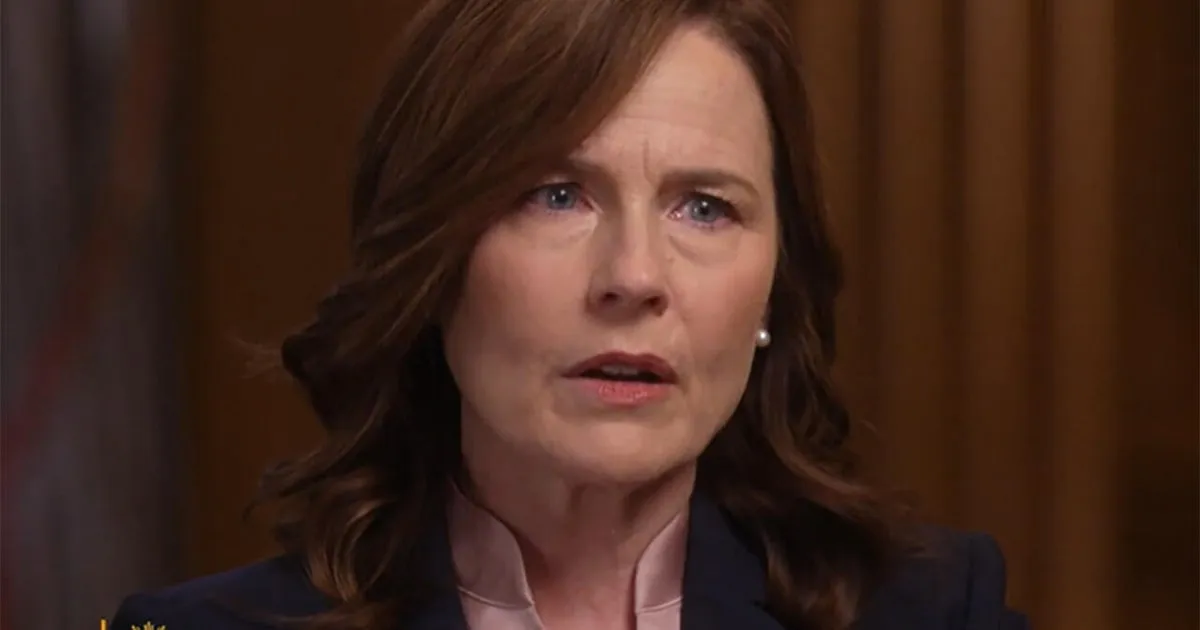
Amy Coney Barrett, a former full-time law professor at the University of Notre Dame in South Bend, Indiana, made headlines in 2020 when she was appointed to the Supreme Court by President Donald Trump. Having spent nearly two decades in academia, Barrett transitioned from teaching to serving as an Associate Justice. Despite her new role, she maintains a connection to education by leading a weeklong seminar on Constitutional Law.
In her first television interview since taking the seat previously held by the late Justice Ruth Bader Ginsburg, Barrett was questioned about the ideological shifts of the Court. She stated, "I think shifting to the right, or shifting to the left, those are other people's labels, and that's other people's game. I just decide the cases as they come." Barrett emphasized that her judicial decisions have drawn criticism from both conservative and liberal factions.
Barrett's legal philosophy and personal journey are explored in her new book, Listening to the Law, which was released on September 9. In it, she reflects on the challenges she has faced since becoming a Supreme Court Justice, noting, "I'm happiest with my old friends who knew me before I became Justice Barrett." However, she expresses pride in her work on the High Court, stating, "I don't regret it, and I think it's really important work."
As a mother of seven, Barrett is recognized as a significant influence on the Supreme Court today. Her pivotal vote to overturn Roe v. Wade in the 2022 Dobbs decision marked a monumental change in abortion rights, dismantling nearly five decades of legal precedent. In response to concerns raised by dissenting Justices about the implications of this ruling on other reproductive health issues, Barrett clarified, "Those are issues inherent in medical practice… and those are questions that are left now to the democratic process."
The Dobbs ruling has incited fears about the future of other rights, including same-sex marriage. During a recent appearance on the Raging Moderates podcast, former Secretary of State Hillary Clinton warned that the Court might challenge these rights similarly to how they approached abortion. Barrett responded by reminding listeners that many of these rights, including the right to marry and raise children, are considered fundamental under existing legal doctrine.
Currently, Barrett and her fellow justices are deliberating on cases concerning former President Trump's executive orders. These cases often center around whether the President has overstepped his executive authority, particularly regarding immigration policies and other controversial actions. Barrett explained, “It’s not our job to survey and decide whether the current occupant of an office is to form a political view… Our job is to decide these legal questions.”
Barrett further elaborated on the judiciary's role, emphasizing the importance of approaching each case with an open mind and relying heavily on legal briefs and oral arguments. She stated, “Judges have to approach things with an open mind on a specific set of facts.” This philosophy underscores her commitment to impartiality and thoroughness in her judicial duties.
As the Supreme Court gears up for another term filled with high-stakes cases, Barrett remains a central figure to watch. Reflecting on her lifetime appointment, she humorously noted, “I haven't gotten so old I'm actually thinking about retirement just yet.” Her insights, particularly regarding controversial topics such as tariffs and executive power, will undoubtedly shape the legal landscape in the years to come.
For more details about her experiences and legal philosophies, check out her book, Listening to the Law: Reflections on the Court and Constitution, available in multiple formats.